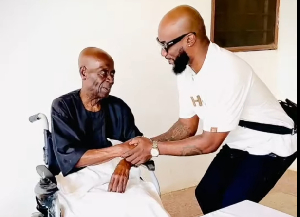Accra, Feb. 15, GNA - The Ghana Health Service (GHS) on Thursday assured the public of the safety of the drug administered to school children during the national de-worming exercise this week, saying it was in conformity with the recommendation of the World Health Organisation (WHO).
It said the dosage of 500mg of Mebendazole had been widely used in similar school-based de-worming exercises throughout the world. Dr. Henrietta Odoi-Agyarko, Acting Director of Public Health, gave the assurance when she briefed the media in Accra on GHS' response to concerns raised about the de-worming exercise.
The national de-worming exercise, the first to be organized by the authorities, which began on Monday and is expected to end on Friday ran into problems when there were rumours that some school children had died after taking the drug.
A total of 4.5 million children from kindergarten to Junior Secondary School (JSS) in 28,043 schools are expected to take the drug for the treatment of soil-transmitted worms only. The exercise was simultaneously carried out throughout the country but reports from the Volta and Eastern regions indicated that some children in certain schools developed skin rashes and abdominal cramps after taking a tablet of the de-wormer and were rushed to the hospitals.
Dr. Odoi-Agyarko noted that the health partners treated the rumours seriously and dispatched a seven-member team of the Independent Centre for Pharmacovigilance of the University of Ghana Medical School, Legon, on Tuesday to investigate alleged reports of adverse reactions emanating from the Eastern and Volta regions where the rumours emanated from.
She said the report submitted by the team indicated that there was no iota of truth in the rumours that children had died after taking the drug. She said the few side effects observed were not unexpected from the administration of Mebendazole adding, "This was indicated in the Teachers Training Guidelines and the kit for media briefing."
Dr Odoi-Agyarko said the unfounded media reportage of death of children and several others falling into coma caused a national pandemonium. She explained that all the reported adverse effects of the Mebendazole 500mg such as stomach crumps, vomiting, headaches, nausea and dizziness were normal which could be managed by water and could not have caused the alleged deaths. Dr Odoi-Agyarko noted that all the alleged cases were treated with water and reassurance but some parents panicked and stormed their children's schools and picked them to hospitals whilst some parents beat up some teachers for giving their children "poison".
Mr Samuel Owusu-Agyei, a Deputy Minister of Health, assured the public that the exercise had immense benefits for Ghanaian children and pledged that the partners will continue to monitor the programme.
The drug, imported by UNICEF, was manufactured by Remedica Limited in Cyprus in August 2005 and would expire in August 2010.
The national de-worming exercise is jointly organized by Ghana Health Service (GHS) in collaboration with Ghana Education Service (GES) and UNICEF. Headteachers, school health teachers and health personnel have been trained to administer the de-worming medicine, which is estimated at a total cost of 80,000 dollars.
The idea of the exercise is to promote good nutrition among school-aged children and address the link between worm infestation, sanitation and hygiene in schools, which caused a host of serious problems and often prevented children from attending school or being able to concentrate in class.
Health News of Thursday, 15 February 2007
Source: GNA
















